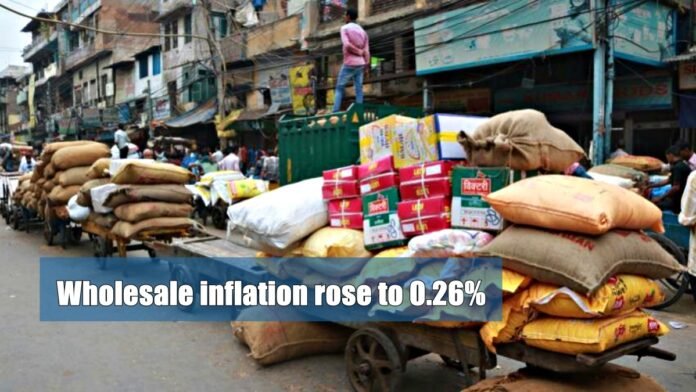
New Delhi: The Wholesale Price Index (WPI) based inflation, which measures the changes in the prices of goods sold and traded in bulk, rose to 0.26 percent in November 2023, after remaining in the negative territory for seven consecutive months. The increase in inflation was mainly driven by the rise in the prices of food items, minerals, and manufactured goods, according to the data released by the Ministry of Commerce and Industry.
Factors behind the inflation
The WPI inflation had been declining since March 2023, when it was 1.34 percent, due to the impact of the COVID-19 pandemic and the subsequent lockdowns on the demand and supply of goods. The WPI inflation turned negative in April 2023, indicating a deflationary trend, and remained so till October 2023, when it was minus 0.52 percent. However, in November 2023, the WPI inflation turned positive, reflecting a recovery in economic activity and the demand for goods.
The main factor behind the inflation was the surge in the prices of food items, which weigh 24.38 percent in the WPI basket. The food inflation, which measures the changes in the prices of food articles, jumped to 8.18 percent in November 2023, from 2.53 percent in October 2023. The sharp rise in food inflation was due to the increase in the prices of vegetables, fruits, eggs, meat, fish, pulses, and cereals, among others. The food inflation was also influenced by seasonal factors, such as the onset of winter and the festive demand.
Another factor that contributed to the inflation was the rise in the prices of minerals, which weighed 1.52 percent in the WPI basket. The mineral inflation, which measures the changes in the prices of minerals, soared to 9.11 percent in November 2023, from minus 9.87 percent in October 2023. The increase in mineral inflation was due to the higher prices of iron ore, manganese ore, copper ore, and crude petroleum, among others.
The third factor that pushed up the inflation was the increase in the prices of manufactured goods, which weigh 64.23 percent in the WPI basket. The manufactured goods inflation, which measures the changes in the prices of manufactured products, rose to 1.67 percent in November 2023, from 1.19 percent in October 2023. The increase in manufactured goods inflation was due to the higher prices of machinery and equipment, computers, electronic and optical products, motor vehicles, other transport equipment, and other manufacturing goods, among others.
Implications of the inflation
The rise in the WPI inflation has implications for the economy and monetary policy. The WPI inflation reflects the cost pressures faced by the producers and the wholesalers, which may be passed on to the consumers and the retailers, leading to a rise in the Consumer Price Index (CPI) based inflation, which measures the changes in the prices of goods and services consumed by the households. The CPI inflation, which is the main indicator of inflation for the Reserve Bank of India (RBI), rose to a three-month high of 5.55 percent in November 2023, from 4.48 percent in October 2023, due to the rising food prices. The CPI inflation was above the RBI’s target range of 2-6 percent for the ninth consecutive month.
The RBI, which is responsible for maintaining price stability and supporting growth, recently kept the key policy rates unchanged in its bi-monthly monetary policy review on December 4, 2023. The RBI maintained an accommodative stance, meaning that it is willing to cut rates further if needed, to support the economic recovery from the pandemic. However, the RBI also expressed concern over the inflationary pressures and revised its inflation projections upwards. The RBI projected the CPI inflation to be 5.6 percent for the third quarter of 2023-24, 5.2 percent for the fourth quarter of 2023-24, and 5.4 percent for the first quarter of 2024-25. The RBI expected the inflation to moderate to below 5 percent in the second quarter of 2024-25, due to the easing of supply-side constraints and the favourable base effects.

The RBI also stated that it would closely monitor the inflation dynamics and take appropriate measures to ensure that the inflation remains within the target range. The RBI also emphasized the need for coordinated policy actions by the central and state governments to address the structural issues and the supply-side bottlenecks that are driving inflation. The RBI also urged the government to take steps to reduce the taxes and duties on petroleum products, which have a cascading effect on the prices of other goods and services.












































